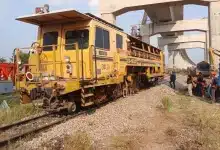Bangkok to Beijing train: Mekong River railway bridge opens

Travellers are one step closer to an epic train journey from Bangkok to Beijing as a new railway bridge over the Mekong River has opened, linking Thailand and Laos by rail for the first time. This milestone, completed last month, leaves just a few dozen miles of a trackless gap before the route can finally reach China.
With the launch of this new service, passengers can now enjoy a 12-hour train journey from Bangkok’s Krung Thep Aphiwat Station to Khamsavath Station in Vientiane, the capital of Laos. However, Khamsavath, located about 9.7 kilometres outside Vientiane, is currently the final stop on this route. Travellers wishing to continue their journey to China must navigate Vientiane’s streets via taxis or vans to reach the larger, Chinese-built Vientiane Railway Station, which lies 16 kilometres northeast of the capital.
The remaining tracks could be laid by 2028, completing the long-awaited connection to China. Once finished, the route will link Bangkok directly to southern China’s high-speed rail network, marking a significant boost for trade and tourism in the region.
In the meantime, the new Bangkok-Vientiane route is already expected to stimulate trade between Thailand and Laos, while also attracting international tourists to Laos, which is becoming increasingly open to foreign visitors.
The cost of the journey is surprisingly affordable, with third-class seats priced at just 7.80 New Zealand dollars (around 164 baht), while air-conditioned second-class seats cost 16 NZ dollars. For those seeking more comfort, convertible beds are available, with upper bunks priced at 22 dollars and lower bunks at 25.30 dollars.
The government-run State Railway of Thailand (SRT) is working closely with Lao National Railway State Enterprise officials to ensure smooth operations, while Lao drivers take control of the train after it crosses into Laos to avoid international liability issues, reported Scoop NZ.
ORIGINAL STORY: Train travel from Bangkok to Beijing inching closer
Train travel between Bangkok and Beijing is moving closer to reality as Thailand gears up to expand its rail network. This new venture promises to transform travel and trade in the region, connecting major cities in Thailand, Laos, and China.
The State Railway of Thailand (SRT) announced a trial service between Bangkok and Vientiane, the capital of Laos, on July 13 and 14. According to SRT spokesperson Ekarat Sriarayanphong, this link will enhance transportation between the two countries and pave the way for a seamless rail journey to China.
The new route will allow passengers to travel from Bangkok to Beijing via stops in Vientiane and Kunming in southern China, where a semi-high-speed service to Beijing is available. Covering approximately 2,000 miles (3,218 kilometres) through mountainous terrain, the journey will take almost a full day. In contrast, a direct flight takes under five hours. However, the scenic and economic benefits of train travel are expected to outweigh the longer journey time.
Currently, a high-speed train operates between China and Laos, significantly reducing freight delivery times to China. What used to take two days by truck now takes just 15 hours by train, according to a report by Nikkei. This efficiency boost is a game-changer for Thai exporters.
Thailand’s push to enhance connectivity with China, its largest trading partner, is aimed at boosting economic growth. Thai exports to China nearly reached US$32 billion (approximately 1.17 trillion baht) in the first 11 months of last year, with fruit and rubber products leading the charge. Imports from China, dominated by electrical equipment and machinery, totalled US$65.3 billion during the same period.
Tourism between the two nations is also set to flourish. Chinese visitors can stay in Thailand for up to 60 days, while Thai tourists enjoy 30-day stays in China. A forthcoming high-speed rail link, albeit delayed until 2028, will further solidify these ties, promising an exciting future for travel and trade in Southeast Asia, reported Bangkok Post.
Latest Thailand News
Follow The Thaiger on Google News:


























